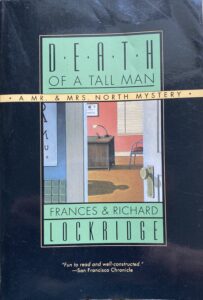Two weeks ago we took a look at Stephen King’s statement regarding why writers write. We concluded that while it sounded noble, it wasn’t overly accurate.
Most writers write to make money. If they happen to enrich people’s lives along the way, that’s a nice bonus.
This week I’d like to look at Edgar Rice Burroughs’s far more realistic assessment.
In August of 1931, Forrest J Ackerman, then 14, got into an argument with his teacher over the literary merits of Tarzan. Ackerman then wrote a letter to Burroughs telling him about it.
Burroughs sent a letter back to Ackerman. Here is the reply:
Thanks for your letter. Tell your teacher that, though she may be right about my stories, there are some fifty million people in the world who will not agree with her, which is fortunate for me, since even writers of garbage-can literature must eat.
My stories will do you no harm. If they have helped to inculcate in you a love of books, they have done you much good. No fiction is worth reading except for entertainment. If it entertains and is clean, it is good literature, or its kind. If it forms the habit of reading, in people who might not read otherwise, it is the best literature.
Last year I followed the English course prescribed for my two sons, who are in college. The required reading seemed to have been selected for the sole purpose of turning the hearts of young people against books. That, however, seems to be a universal pedagogical complex: to make the acquiring of knowledge a punishment, rather than a pleasure.
I want to emphasize two points out of this excellent statement.
Love of Books
“If [my stories] have helped to inculcate in you a love of books, they have done much good.”
To my mind, reading fiction should be a pleasure. It should instill in the reader a love of books.
Like many of you, I acquired that love very early. I doubt I was even in kindergarten. Books such as Seuss’s Scrambled Eggs Super and Syd Hoff’s Danny and the Dinosaur I still fondly remember. And I’ve loved reading and books ever since.
That love I helped to instill in my daughter. And I now encourage reading whenever I can. For a love of books is far more beneficial than a love of TV, or movies, or video games. Reading has so many additional benefits than video entertainment. It is a skill that is critical to the survival of civilization.
As Burroughs himself points out in his letter: teaching seems to universally have as its goal to make acquiring knowledge a punishment, rather than a pleasure.
This especially affects boys. Is it any wonder girls now go to college in greater numbers than do boys? When reading is a “girl thing”, it only follows that studying is also for “girls” — and what young boy in his right mind wants to like a girl? None when I was growing up, and I don’t think boys have changed all that much in the years since.
Therefore we should encourage authors to write books with good male role models. Because boys don’t identify with female leads. Reading about hot babes and kickass heroines comes in after puberty — if they read at all by that time.
Entertainment
“No fiction is worth reading except for entertainment.”
In my opinion, this is where it is at. Say what one will, the ultimate purpose of a story is to entertain. It may do other things as well — but if it doesn’t entertain, it does nothing beneficial. And it may even go so far as to destroy the impetus to read.
Burroughs noted that if a story entertains and is clean, it is good literature. And the best literature is that which forms the habit of reading in people who might not otherwise read. That is the best form of enrichment. The enrichment of lives. The lives of those who weren’t previously readers.
Comic books are entertainment and are often put down by parents. However, my first exposure to Jules Verne was a comic book version of From Earth to the Moon. It didn’t hurt me. I’m still an avid reader. And I even read “good literature”.
Writing’s Purpose
The purpose of writing fiction is the same as the ancient art of telling a story around the fire: to entertain. The story may also teach a lesson, or moral, or a bit of philosophy. But if the story doesn’t entertain, then it has failed in its main purpose and also in any secondary purpose. And may even turn off the reader. A lifetime of potential pleasure gone in a moment.
I also want to mention Burroughs’s comment “…even writers of garbage-can literature must eat.” Burroughs wrote to entertain and make money. And he made a lot of money.
What I especially like is that Burroughs was honest. He wasn’t afraid to say he wrote for money.
I wonder: if Mr King says one shouldn’t write for money, then why hasn’t he given away all of his earnings from writing? Seems to me the proof is in the pudding.
Comments are always welcome. And until next time, happy reading!
Share This!

 CW Hawes is a playwright; award-winning poet; and a fictioneer, with two bestselling novels. He’s also an armchair philosopher, political theorist, social commentator, and traveler. He loves a good cup of tea and agrees that everything’s better with pizza.
CW Hawes is a playwright; award-winning poet; and a fictioneer, with two bestselling novels. He’s also an armchair philosopher, political theorist, social commentator, and traveler. He loves a good cup of tea and agrees that everything’s better with pizza.
